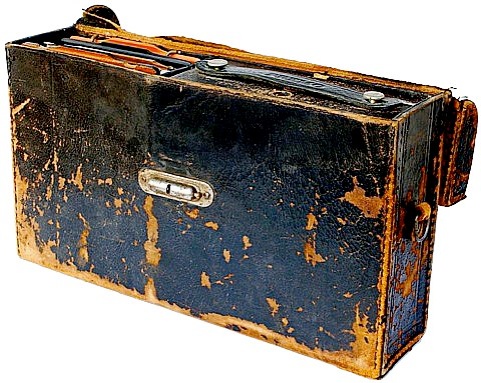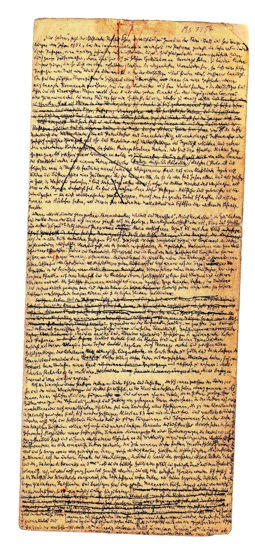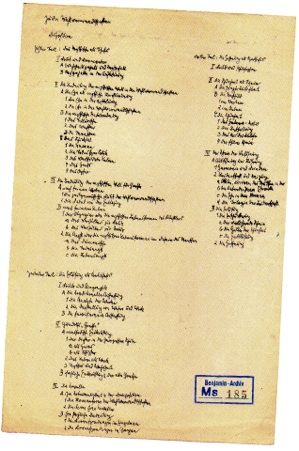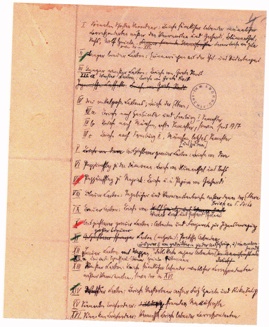Ethnography arcades media critical theory Benjamin briefcase production practice Surrealism.

When I found Benjamin’s briefcase...
Desperate in the midnight hours
of 27 September 1940, Walter Benjamin died. Myth claims the cause of death to be suicide... morphine overdose. Later that day, his body was found by his traveling compatriots in a small
room in Hotel de Francia in Port
Bou on the border between France and Spain. All were en route on
foot over the Pyrenees, escaping
to “freedom” from ensuing fascism.
It is claimed that as Benjamin struggled to carry his heavy, refunctioned camera-briefcase, he exclaimed, “I cannot risk losing it.
It is the manuscript that must be saved. It is more important than I am.” Amongst Benjamin’s possessions recovered on the day
of his death, his briefcase along
with its contents were nowhere to
be found...


“For the tasks which face the human apparatus of perception at the turning point of history cannot be solved by optical means, that is, by contemplation, alone. They are mastered gradually by habit, under the guidance of tactile appropriation.”
“...burst our prison world asunder by the dynamite of a tenth of a second, so that now, in the midst of it far-flung ruins and debris, we calmly and adventurously go traveling.”
“What, in the end, makes advertisements so superior to criticism? Not what the moving red neon says -- but the fiery pool reflecting it in the asphalt.”

“What matters for the dialectician is having the winds of world history in his sails. Thinking for him means: to set sail. It is the way they are set that matters. Words are sails. The way they are set turns them into concepts.”
“The perception of similarity is in every case bound to an instantaneous flash. It slips past, can possibly be regained, but really cannot be held fast, unlike other perceptions. It offers to the eye as fleetingly and transitorily as a constellation of stars.”
“As soon as the criterion of authenticity ceases to be applied to artistic production, the whole social function of art is revolutionized. Instead of being founded on ritual, it is based on a different practice: politics.”
“What is aura, actually? A strange weave of space and time: the unique appearance or semblance of a distance, no matter how close it may be. While at rest on a summer’s noon, to trace a range of mountains on the horizon, or a branch that throws it shadow on the observer, until the moment or the hour become part of myth appearance -- this is what it means to breathe the aura of those mountains, that branch.”
“Our investigation proposes to show how, as a consequence of this reifying representation of civilization, the new forms of behavior and the new economically and technologically based creations that we owe to the nineteenth century enter the universe of a phantasmagoria. These creations undergo this “illumination” not only in a theoretical manner, by an ideological transposition, but also in the immediacy of their perceptible presence. They are manifest as phantasmagorias.”
“Here it is not a question of making (ideas) present in a illustrative or vision-based way; but rather, in philosophical contemplation, the idea is released from the heart of reality as the word, reclaiming its name-giving rights... Ideas are given, without intention, in the act of naming, and they have to be renewed by philosophical contemplation.”
“Materialist historiography is based on a constructive principle. Thinking involves not only the movement of thoughts, but their arrest as well. Where thinking suddenly comes to a stop in a constellation saturated with tensions, it gives that constellation a shock, by which thinking is crystalized as a monad. The historical materialist approaches a historical object only where it confronts him as a monad. In this structure he recognizes the sign of a messianic arrest of happening, or (to put it differently) a revolutionary chance in the fight for the oppressed past.”
“The role of the hand in production has become more modest, and the place it filled in the storytelling lies waste. That old coordination among the soul, eye, and hand which emerges in Valery’s words is that of the artisan which we encounter wherever the art of the storytelling is at home. In fact, one might go on and ask oneself whether the surrealism of the storyteller to his material, in hum dialectic in itself a craftsman’s relationship -- whether it is not his very task to fashion the raw material of existence, his own and that of others, in a solid, useful, and unique way.”
“A story does not aim to convey an event, per se, which is the purpose of information; rather, it embeds the event in the life of the storyteller in order to pass it on as experience to those listening. It thus bears the trace of the storyteller; much the way an earthen vessel bears the trace of the potter’s hand.”
“The writer must not conceal the fact that his activity is one of arranging.”
“No matter how artful the photographer, no matter how carefully posed his subject, the beholder feels an irresistible urge to search such a picture for the tiny spark of contingency, of the Here and Now, with which reality has so to speak seared the subject, to find the inconspicuous spot where in teh immediacy of that long-forgotten moment the future subsists so eloquently that we, looking back, may revolution.”
“What is inevitably felt to be inhuman, one might even say deadly, in daguerreotypy was the (prolonged) looking into the camera, since the camera records our likeness without retuning our gaze. But looking at someone carries the implicit expectation that our look will be returned by the object of our gaze. Where this expectation is met (which, in the case of thought processes, can apply equally to the look of the eye of the mind and to a glance pure and simple), there is an experience of aura to the fullest extent”
“The stripping bare of the object, the destruction of aura, is the mark of a perception whose sense of the sameness of things has grown to the point where even the singular, the unique, is divested of its uniqueness -- by means of its reproduction.”
“In every era the attempt must be made anew to wrest tradition away from a conformism that is arcades to overpower it.”




Television’s intention, particularly within news and information production, is to exact certain social truths. Image is presented as fact, fact is presented as truth, and truth is folded back again into image presentation. These image-fact-truths are then technologically abstracted into compositions, which, in turn, condition notions of social actuality, then publicly received with little critical questioning or provocation. And so today, we find our technologies have evolved well beyond any reach of “human body-sense”. Cyclically, this demands a pause for deeper reflection, yet the ratcheting upwards of technological advance has left little time or space for critical contemplation. Walter Benjamin feared similarities in 1930’s Germany. While the introduction of new technologies during his time were welcomed for mechanically emasculating the repression of “auras of distance” through reproductive secularization, it was also feared that whomever “sat at the switch” might also produce too-close ideologies that resist public challenge altogether.



TV/media production has long ago forfeited moral claim to “necessary” authority, informational clarity, and social imperative. Yet today TV/media continues to stand as docent to all media practice despite its perverse spectacular production of communication too often emptied of substance and significance. In 2010, TV/media, both cause and effect, continue to fundamentally facilitate profound decay of necessary aura through egregious combinations of reflexive and critical neglect. However, possibilities for redeeming tele-visual discourse, seemingly obsolete within today’s totalizing embrace of technological advance, live on because each moment of our realization carries opportunities of resistance -- beginning from the initial moment of man’s Fall and continuing with each turn of our reproductive capabilities. A “cultural farmer’s” revolutionary task, therefore, is not only to dialectically challenge technological perversion within each individual’s profession, but also to lead in its refunctioning of ideological practice into tools of social liberation. For when our most innovative visualizing elite, along with their tools and practices, are neither understood by bourgeois intelligencia (brain workers) or by the laboring proletariat (body workers), the necessity for cultivating new, public, redemptive, social strategies of “oversight” becomes paramount.


Benjamin’s Briefcase is my tele-visual palimpsest. It is a simple, allegorical construct profanely re-fragmented, felt, then re-membered, and felt again. Cultural Farming’s Trauerspiel embodies a negation, or demythification, of illogical ideological TV/media reification -- and into a “mortifying performance” of its own reckless ruination. This project of fifteen volumes represents only a portion of my initial collection of “ritualistic findings” over the course of six years of continuous ethnographic data collection. They are but a small civic exchange to those untold, reluctant, too-clever-times-two mediamongering producers. To you I say, “Look what you have done to the very life-blood of contemporary communication. I intend to castrate your malfeasance, to publicly put it to death, my friends, in the name of liberation, as you have castrated yourselves and us all.”

Maybe this is why Benjamin, though granted the first portion of his PhD, was ultimately denied the second part -- his habilitation -- thus, officially barring his entry into the academy. And, the title of his rejected habilitation?: “Ursprung des deutschen Trauerspiel” (The Origin of German Tragic Drama). My reading of Benjamin suggests, as practiced throughout his Arcades Project, he deeply understood that “meaning” inside any medium is understood through an examination of the medium as method. It is this notion of Trauerspiel that will soon be shown as a foundational method of (Brechtian) mediaturgy. But then... “maybe my whole fallacy is wrong.”
Images: Walter Benjamin Archive
Ransacking Quotations from Benjamin’s Briefcase:


Vol 1 - One Man Armies: Security and Camera-Gun Technologies (23:21)
http://www.hollandwilde.com/theory/I_One%20Man%20Armies.mov
Vol 2 - Our Aural Eye: Vision and Sensory Embodiment (23:37)
http://www.hollandwilde.com/theory/II_Our%20Aural%20Eye.mov
Vol 3 - Liminal Thresholds: Human Between Settled and Unsettled Lands (23:13)
http://www.hollandwilde.com/theory/III_Liminal%20Thresholds.mov
Vol 4 - Stranger Danger: Infantilization and the Production of Childhood (23:20)
http://www.hollandwilde.com/theory/IV_Stranger%20Danger.mov
Vol 5 - Market Media: Making Mad Marx Money (23:17)
http://www.hollandwilde.com/theory/V_Market%20Media.mov
Vol 6 - Wasted Vastlands: Waging Journalism with Perpetual War (23:35)
http://www.hollandwilde.com/theory/VI_Wasted%20Vastlands.mov
Vol 7 - Typage Kingdom: Extermination Through Animal Characterization (23:31)
http://www.hollandwilde.com/theory/VII_Typage%20Kingdom.mov
Vol 8 - Screen Realities: Definitions of Technological Determinism (23:33)
http://www.hollandwilde.com/theory/VIII_Screen%20Realities.mov
Vol 9 - Climate Change: Weathering Productions of Information (23:36)
http://www.hollandwilde.com/theory/IX_Climate%20Change.mov
Vol 10 - Graven Images: Reminiscing the Second Commandment (23:33)
http://www.hollandwilde.com/theory/X_Graven%20Images.mov
Vol 11 - Allied Forces: Recruiting the Death of Dying (23:24)
http://www.hollandwilde.com/theory/XI_Allied%20Forces.mov
Vol 12 - Terminal Telephony: Why Can't You Hear Me Now? (23:30)
http://www.hollandwilde.com/theory/XII_Terminal%20Telephony.mov
Vol 13 - Earth Television: The Perils of Unnatural Representation (23:25)
http://www.hollandwilde.com/theory/XIII_Earth%20Television.mov
Vol 14 - Seeds of Change: Foods of the Chemical Cornucopia (23:19)
http://www.hollandwilde.com/theory/XIV_Seeds%20of%20Change.mov
Vol 15 - Exotic Bodies: Mediations in Human Shape-Shifting (23:29)
Allegorical Laments (Trauerspiel)
Rituals and Myths of North American Television
The odd conclusion to this story is that I have had
Benjamin’s missing briefcase all along. Only I did not
understand that until now. And when I looked, indeed, there it was...
...filled neither with work or art, but instead with maps of the work art must do.
Maps of strange terrains I had only previously heard of, but had traveled well down already.
28 Feb 2010
“Through the hieroglyph of a breath... I can find once more the idea of a sacred theatre”
- Antonin Artaud, Theatre, p134, 141.
“...Myth is the term for everything which exists and subsists only on the basis of language. There is no speech so obscure, no gossip so fantastic, no remark so incoherent that we cannot give it meaning. One can always assume a meaning for the strangest language. ...Myths vanish under the light in us which is generated by the combined presence of our bodies and of our highest perceptions.”
-
-Paul Valéry, Selected Writings, p199.
“The Philosopher: Crying doesn’t express sorrow so much as relief. But lamenting by means of sounds, or still better words, is a vast liberation, because it means that the sufferer is beginning to produce something. He’s already mixing his sorrow with an account of the blows he has received; he’s already making something out of the utterly devastating. Observation has set in.”
-
- Bertolt Brecht, The Messingkauf Dialogues, p47.
An American, living
in Canada, now spending his life experimenting with new forms of critical media ethnography.



